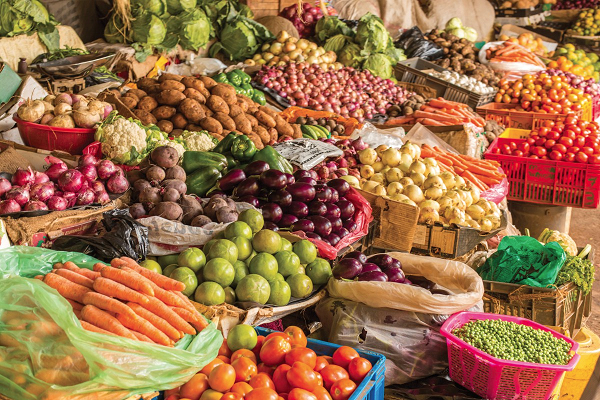Food prices across the country have seen an upward surge over the past few months, according to the latest market survey performed by the Ghanaian Times, food costs have risen substantially in various market centres around the country, owing primarily to the increase in fuel prices.
Reports from the Kasoa and Akwelley markets in the Central Region’s Awutu Senya East Municipality stated that traders blamed the situation on transportation costs, adding that Easter celebrations had also driven hikes in basic necessities.
A sack of onions, which used to sell for GH350.00 around two months ago, is now selling for between GH450.00 and GH500.00 at the Akwelley market, whereas a bag of maize is starting to sell for GH600.00, more than double the price last year of GH300.
A five-litre gallon of palm oil, which was previously priced at GH70.00, is now sold at GH85.00, while a crate of eggs, which was previously priced at GH15 or GH12 depending on the size of the eggs, is now priced at GH26.00 or GH30.00.
The medium-size bucket full of garden eggs was selling for GH50.00 instead of the GH35.00 it was charging six weeks ago and a tuber of yam that was selling for GH8.00 last December is now selling for GH15.00.
Traders and some customers urged authorities to enact regulations that would slow the rate at which products and services prices were rising by the day.
Although there was always a supply of tomatoes at the Kasoa old market, Auntie Victoria Boateng, who sells them, said the price continued rising, adding that she bought a box of fresh tomatoes for GH300 last week Monday. “However, on Monday, when I went for another consignment, I bought each box for GH400.00, despite the fact that prices of various important food products had climbed; this present increase is due to the Easter celebrations,” she explained.
The customers bemoaned the fact that circumstances were tough and that providing for their families had become difficult due to the rising prices of goods and services.
A student-teacher bemoaned the fact that whenever he went to the store to resupply supplies at home, he was confronted with new costs, which he characterized as alarming.
A tuber of yam prices in the Agbogbloshie, Adenta, Madina, Mallam, Kaneshie, Odawna (Circle) markets, the Accra Central Business District (CBD), and the Kasoa Market have increased by a double from GH5 last year to GH10.
Beans that used to cost GH6 now cost GH8 depending on the size of the cup, groundnut costs GH4 and up, gari costs GH3 and up, and a maize “olonka” that cost GH7 last year now costs GH15 and above.
The increase in items according to several shop owners, was caused by the high cost of shipping products from Accra and Kumasi to the Upper West Region.
Five sizeable tubers of cassava sell at GH₵20 and upwards, five fingers of plantain sell at GH₵50 and beyond as against GH₵30 last year, six pieces of okro sell at GH₵5 and beyond while oil sells at GH₵7 and beyond depending on the size of the bottle.
A 5kg bag of rice last year sold at GH₵30 now sells at GH₵45 and beyond, a small-sized basket of tomatoes which could sell between GH₵30 and GH₵50 last year, now sells at GH₵80 and above.
A crate of eggs is now selling at GH₵25 and beyond from initial starting prices of GH₵18 and GH₵19 at some places depending on the size of the eggs.
Taro leaves (kontomire) now sell at GH₵8 and beyond at some markets meanwhile it was 3 for GH₵5 last year, bell peppers sell at GH₵2 and beyond, same for ginger and garden eggs while turkey berry (beduru or Kwahu nsusuaa) is sold at GH₵1 up from 50Gp last year.
Three oranges cost GH3, although three pieces were GH1.50 last year, bell peppers cost the same, pineapple cost GH3, but now costs GH 5 and beyond, and bananas cost the same. Avocado, which was sold at GH1 last year, is now GHC3 and above, pawpaw is now GHC2 and above, velvet tamarind (yooyi) was sold at GH1 last year and is now GHC2 and above, and salmon, which was sold at GH5 last year, is now GHC7 and above.
Speaking to some of these traders, they said the government had to, as a matter of urgency, do something to help Ghanaians because the “hardship” in the country was heightening.
Some of these traders also stated that due to the increase in the price of items every now and then, they have no choice but to also add up to the prices of their items in order to maximise profit.

